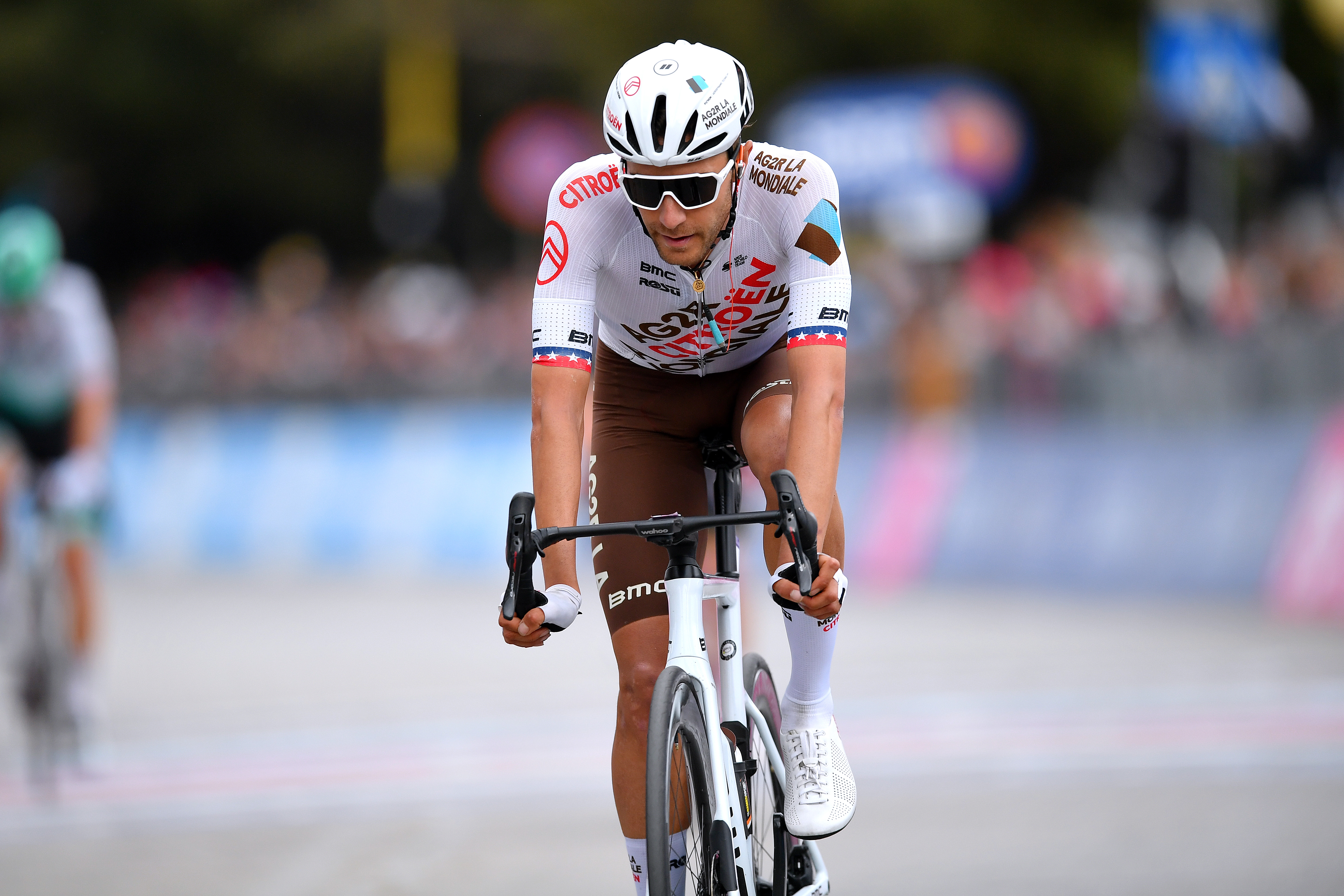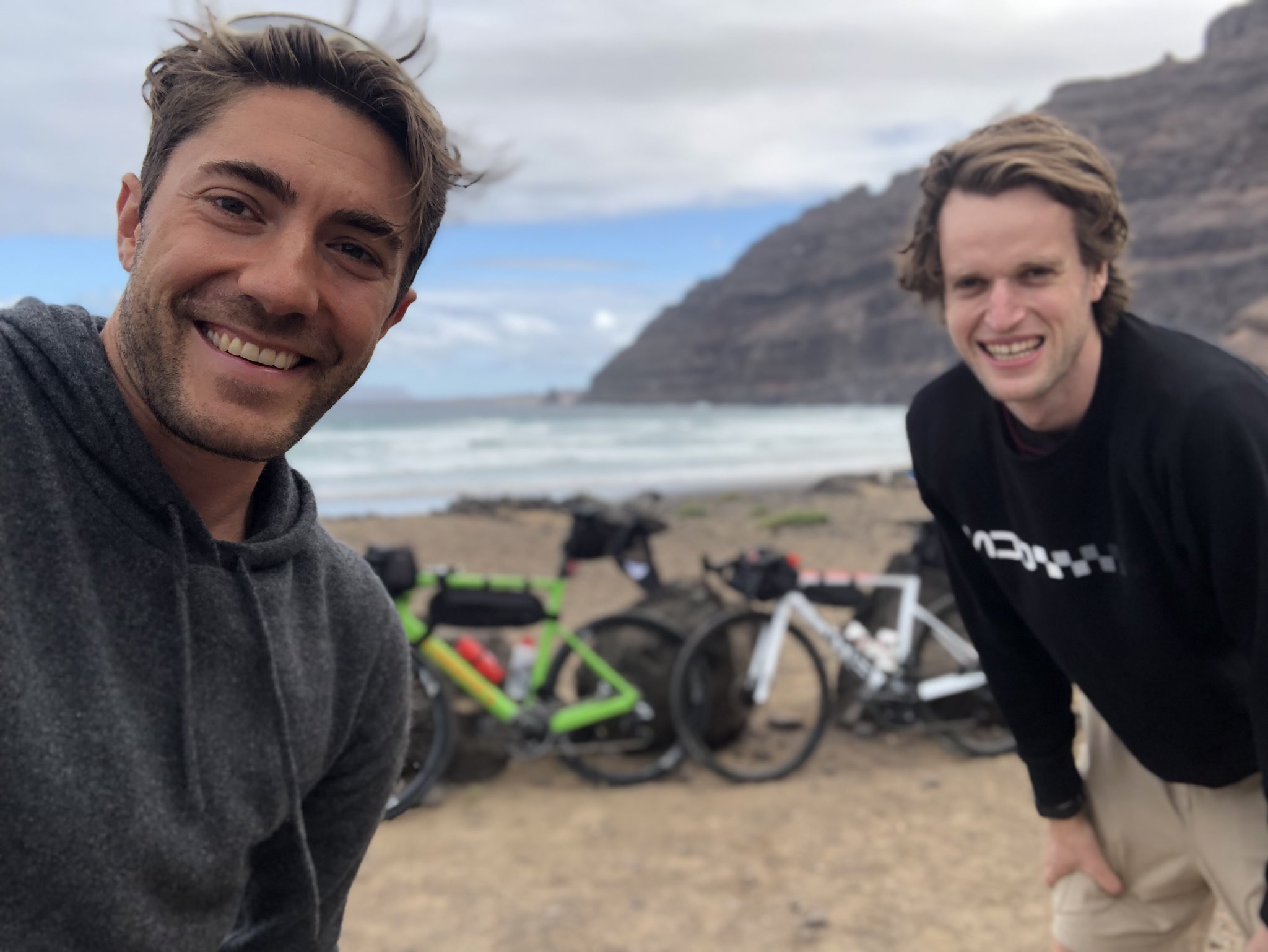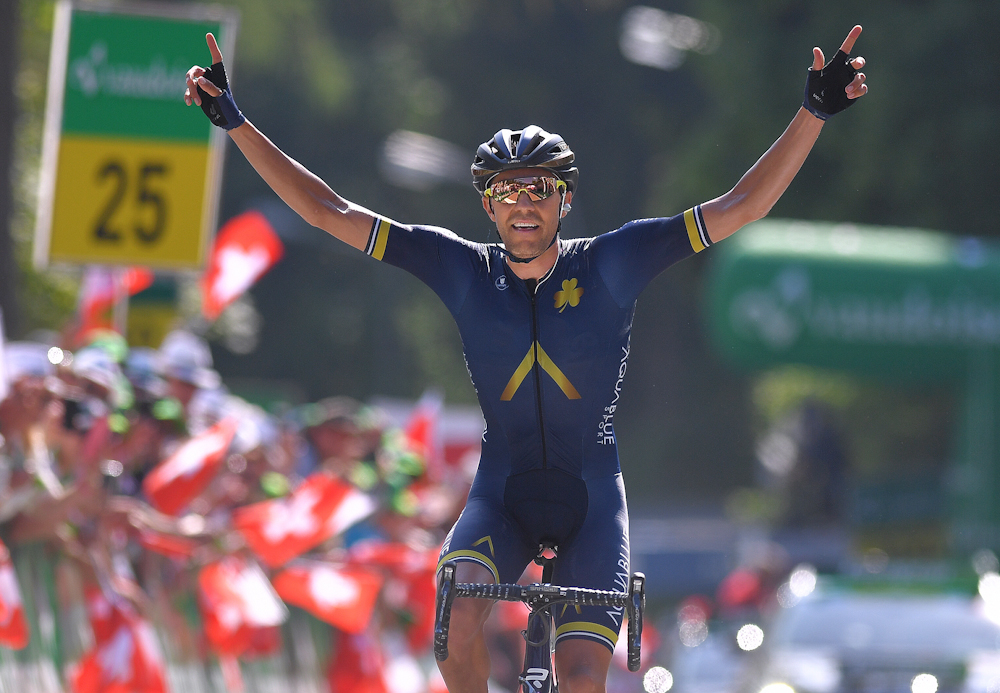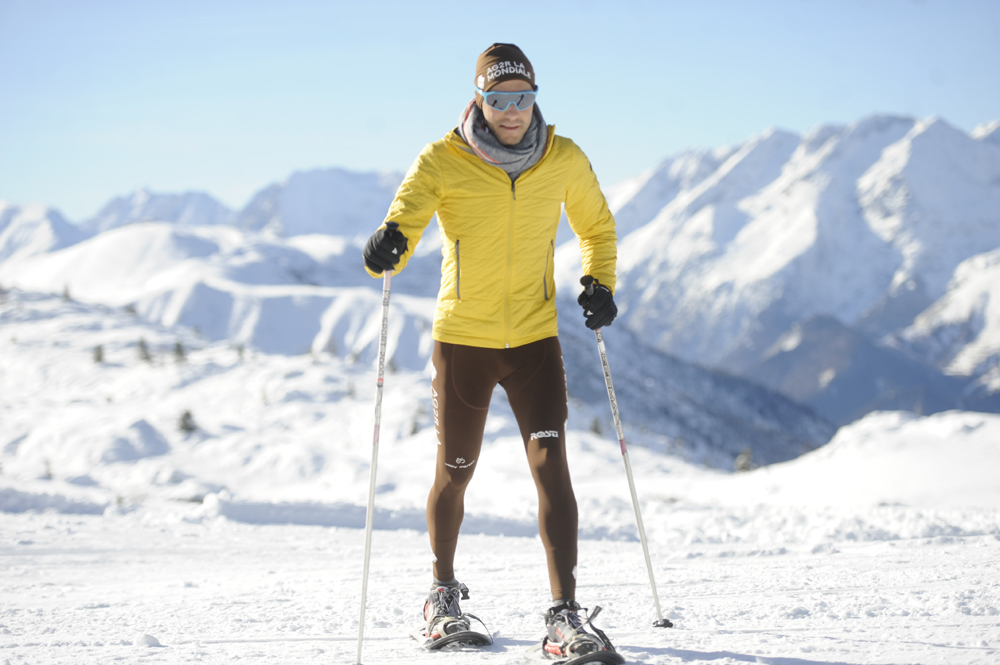Larry Warbasse: I've danced on the line of burnout my entire career
US rider explains how paddleboarding and bikepacking have restored some balance to his life

If you’re looking for Larry Warbasse, try the bay at Villefranche-sur-Mer, just round the headland from Nice. Specifically, look for a man standing on an inflatable board, with a pole stretching from his hands down into the bright blue water.
Paddleboarders have exploded in number in the past couple of years and Warbasse is one of them.
“It’s really good for your core,” he suggests, somewhat unconvincingly. This is what all paddleboarders will tell you, but it’s not the real reason any of them actually do it.
“I started going a few times a week during the summer just to get myself out of the house,” he adds, getting to the nub of it.
The coronavirus pandemic forced everyone in on themselves to a certain extent. For Warbasse, however, this runs deeper.
“COVID just magnified the life I was already living. It made me reflect and realise ‘this isn’t working’,” the former US champion reveals, speaking to Cyclingnews in an off-season interview.
Even before the pandemic, when not riding his bike, Warbasse would usually be on the sofa, only getting up to stare at the food in his fridge that he wouldn’t allow himself to eat, and only looking up from the television to stare at the mobile phone that would tell him which riders had ridden further and faster than him that day.
Get The Leadout Newsletter
The latest race content, interviews, features, reviews and expert buying guides, direct to your inbox!
“If you sit inside, all you think about is bike bike bike bike bike,” he said. “It’s really dangerous, actually.”
On the water, by contrast, Warbasse’s only immediate concern is to avoid falling into the Mediterranean, and even that doesn’t sound like such a bad thing.
“After a big training ride, just getting yourself out of the house can sometimes feel like this monumental leap, but as soon as you leave the door and you get to this place, it’s almost like the cloud over you disappears,” he explained.
“You don’t feel tired. You’re not thinking about what other people are doing. You’re not thinking about your diet. You’re not even hungry anymore. And it’s like ‘why do I not do this more often?’"
Bikepacking again with Dunne
Paddleboarding isn’t the only means of escape for Warbasse. Earlier this month, he strapped some bags to his bike and spent five days island-hopping the Canaries, riding from dawn until dusk and sleeping under the stars.
He was joined by his old pal Conor Dunne in a revival of the famous ‘No-Go Tour’ of 2018, which had seen them bikepacking through the Alps as a coping mechanism for the sudden demise of their team, Aqua Blue Sport. This time, they ticked off the highest points of Lanzarote, Fuerteventura, Tenerife, Gran Canaria, and La Gomera, with plenty of gravel tracks and a few wrong turns.
“It ended up being a lot harder, mainly because we were both so unfit compared to last time, but also because last time we just decided the night before where to go the next day, so we could adjust the route. But with this one we had to stick to it, even if we were really tired,” Warbasse said.
“We didn’t think we’d be racing sunsets. We nearly decided not to pack lights but we ended up using them every day. We were expecting a chill tour, but in the end it was really hard, so we both felt a real sense of accomplishment, which is funny because before we left we were like ‘this is going to be too easy’.”

Warbasse revealed that he didn’t know what a bivvy bag was before agreeing to the trip, and that sleeping on beaches was a shock to the system considering he wears earplugs at night in his quiet French Riviera apartment.
Still, there perhaps wasn’t quite the same sense of adventure as the original, given Dunne is now retired and working for the Global Cycling Network YouTube channel and Warbasse is safely under contract for another year at AG2R Citroën Team. What’s more, this time they had a strict schedule to follow, and a ferry to catch each morning.
The end result, however, was very similar.
“What it does is it totally gets you out of that racing mindset," Warbasse said.
"The reason most of us started riding our bikes was because we loved to ride our bikes, and we especially loved to ride our bikes with our friends, and I think sometimes when we get really focused with all the training and the intervals and everything, doing something like this really knocks you out of that narrow-minded monk-life focus.”
'I was trying to be like one of the kids of the new generation'
The sense that Warbasse isn’t broaching any new ground here is telling. Professional cycling, according to more and more of its protagonists, has become an all-consuming endeavour, where the datafication of every last aspect of performance threatens to reduce riders to machines, and where the hyper-connected world around offers no hiding place.
It says enough that the term ‘burnout’ has become embedded alongside the likes of ‘peloton’ and ‘bidon’ in the cycling lexicon.
“I think I’ve been dancing on the line of burnout my whole career,” said Warbasse, now 31.
Warbasse turned professional with BMC Racing in 2013, having ridden for the former American team’s development setup. He spent two years there and two years at IAM Cycling before dropping to the second-division Aqua Blue team, where he landed his two career victories: a stage at the Tour de Suisse and the US national road race title.
He committed his future to the Irish squad but soon had his career pulled from underneath him, as the team suddenly went bust towards the end of 2018. After returning from his Alpine ‘No-Go Tour’ adventure with Dunne, he was handed a one-year lifeline at AG2R, did enough to earn another year, and then enough to earn a two-year deal through 2022.

It has been a turbulent career, and one that has coincided with a generational shift in the sport, with young riders making instant impacts – a trend that is chiefly attributed to the professionalisation of the junior and U23 ranks.
“Cycling has changed a lot from when I turned pro. There used to be a lot more guys like me. I’m a very sociable being, outgoing, and that’s how I got into it; it’s a social sport. But this new generation is very hyper focused,” Warbasse said.
“I think I was trying to be like one of the kids of the new generation. I was trying to live the way I thought a cyclist should live, even though it was kind of counter to who I am as a person. It seemed like the thing to do was to close myself off and live this super-isolated monk life, where I just measure everything, calculate everything, do everything to the exact dot. Maybe that means not going out to dinner with friends because you’re worried about what food you’re going to get at the restaurant they’ve chosen, or being scared to take two days off the bike to go somewhere with friends.
“There’s almost like this base level of stress that you never escape from. You’re always comparing yourself to everything you’re seeing. You’re reading Cyclingnews and you’re seeing this guy is smashing it, then you’re on Strava, and you’re like ‘ah this guy just did a bazillion hours today, and I’m just sitting at home’. Even if it’s not conscious, you’re always comparing.”
Striking a balance
For Warbasse, this situation reached its nadir during the first wave of the pandemic.
“My way of coping with the uncertainty of COVID was to train like crazy,” he said, explaining that he finished the year “mentally and physically exhausted” and that it had knock-on effects on his 2021 campaign. He had a solid enough season, with 67 race days and a hand in a few victories, although he missed out on a win and his top form was somewhat wasted as he never landed in the right breakaways at the Giro d’Italia.
The biggest success, though, was perhaps realising what he was doing to himself.
“During the second half of this year, and this off-season, I really reflected on things, on my life. I realised I needed some more balance in my life, and that’s something I’ve been trying to find,” he said.
“Like I said, I got into cycling because I love it. I’m not doing it to get rich, I’m not making the same money as some of these big riders. I ride my bike because I love to ride my bike. I was really losing a lot of that fun in my life, I was too serious and not enjoying it. Halfway through this year I said ‘I need to change something’.”
That started with a break, and has turned into a series of mini-breaks that have allowed him to periodically switch off from the day job.
“I hadn’t really been on vacation the past few years. I’d go home to the US but that was more about seeing family and friends – it wasn’t really shutting off and escaping. So this time I took a break after the Giro and really tried to shut off from the cycling world, from social media, and it really helped.
“This off-season I’ve travelled more than I’ve ever travelled because I was just so hungry for that after a year of being closed in. I took the chance to do things I don’t usually get the chance to and really enjoyed it. It was just a nice relaxing time.”

Warbasse’s new-found balance doesn’t seem to have dampened his professional ambition. He talks with regret about his ‘fine’ 2021 season, saying that “for me, fine isn’t good enough”, and he has set himself a big objective for 2022 in the form of making AG2R’s Tour de France squad.
“It will be really hard, but it’s pretty important for me to do the Tour before the end of my career, and I’m not getting any younger.”
Wherever the season takes him, though, the bay at Villefranche will always be there. As we end our conversation, Warbasse vows to keep up his new hobby, but resists our recommendation of an electric pump. “I think pumping the board up yourself is part of the experience,” he insisted.
Inflating a 10-foot board with a hand pump is no mean feat and, in a peloton of skeletal arms and protruding collarbones, it feels significant that he is prepared to risk gaining dreaded upper-body muscle mass in this way.
Bigger biceps, but a healthier head. Oh, and a stronger core.
Patrick is a freelance sports writer and editor. He’s an NCTJ-accredited journalist with a bachelor’s degree in modern languages (French and Spanish). Patrick worked full-time at Cyclingnews for eight years between 2015 and 2023, latterly as Deputy Editor.
